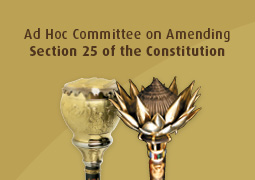
The Portfolio Committee on Public Works and Infrastructure is currently busy with public hearings on the Expropriation Bill. At the start of the hearings yesterday, various organisations shared their views on the bill. The Chairperson of the committee, Ms Nolitha Ntobongwana, said: “In keeping with the Constitution’s requirement that parliamentary legislative processes must facilitate public hearings to ensure that it conducts its processes in an open manner various business organisations and civil society formations have used the opportunity created by the public hearings expressed their views about the bill.”
Ms Ntobongwana said the hearings follow the process of submissions for public views from 10 December 2020 to 10 February 2021, which was then extended to 20 February 2021. To date, Ms Ntobongwana said: “Well over 121 000 submissions via email have been received and 6 000 via WhatsApp.”
Speaking on behalf of the Council for the Built Environment Youth Forum, its President Mr Thato Sekgoele, welcomed the fact that there is political will to bring about land reform and to bring into effect the equitable society envisioned in the National Development Plan of an equitable society. “In my view, the expropriation of land without compensation is central to the principle of Batho Pele that seeks to advance social cohesion and nation building.” He said the bill should be carried out in a manner that will be evaluated and monitored efficiently and effectively. It’s critical that this commitment is made because there is so much that hinges on this bill that can advance the livelihood of the dispossession black majority.
Mr Andre Van Rensburg who represented the Free State Agriculture, said: “We reject this bill or any amendment to Section 25 of the Constitution because it infringes on property rights. We are of the view that as the bill stands, it would have an adverse effect on food security. We are of the view that farm lands should be purchased in an open market.” He further claimed that government threw money on land reform programmes. “The results have been disastrous and money spent in this programme would have bought all the land in South Africa.”
Expressing AfriForum’s view on the bill, Mr Ernst Van Zyl stated that this bill should not become an Act of Parliament because it will have severe effect on the economy and food security. Given the effect this would have on mortgages; this bill would have adverse effect on investor confidence. Besides, he added, “the unjust means of land reform cannot justify its unjust ends”.
AgriSA representative Ms Annelize Crosby acknowledged the psychological effect and the economic hardship brought to bear on black people by apartheid land dispossession policies and legislation. “Our problem with the current status of the bill is that the owners of the land bear an inappropriate burden of expropriation. As a result, it’s a small group of people that would be forced to pay for land reform.”
The representative of Sekeliga, Mr Piet Roux, pointed to a problem with the terminology of the bill itself, which Sekeliga regards as unlawful because it’s not founded on constitutionalism. “If the owners of land are not going to be compensated, that is confiscation. And that is against the rule of law and is unconstitutional.”
The representative of the Banking Association for South Africa, Ms Bongiwe Kunene, pleaded for clarity on the definition of public purpose and interest. If not clarified, it will lead to policy uncertainty and will be open exploitation. “We would also like the bill to make a distinction between property rights and intellectual property. As such, the bill should ensure that it protects the later from being conflated with the former.”
The representative of Congress of Traditional Leaders of South Africa (Contralesa), Mr Mwelo Nonkonyana, commended the bill, which is a step in the right direction. Contralesa is opposed to the idea of compensating thieves who stole their land. “As Contralesa, we know the genesis of the current property clause during the inception of our Constitution that has led to a comprised property clause we have currently.”
In its submission, the Institute of Race Relations stated that in its current form the bill has glaring defects. According to its representative, Dr Anthea Jeffrey, the absence of a prior court order before expropriation can come into effect infringes on the constitutional rights of land owners. This contradicts section 25 of the Constitution of the property clause and Section 33 of the Constitution, which guarantees fair administrative justice and the right to have access to the court to adjudicate any land disputes as stipulated in this clause.
Ms Ntobongwana welcomed all inputs, stating repealing apartheid laws will advance the gains of democracy. “We cannot be stuck to laws that predate our democratic constitution and dispensation and that don’t seek to advance social cohesion and nation-building.”
Abel Mputing
25 March 2021

